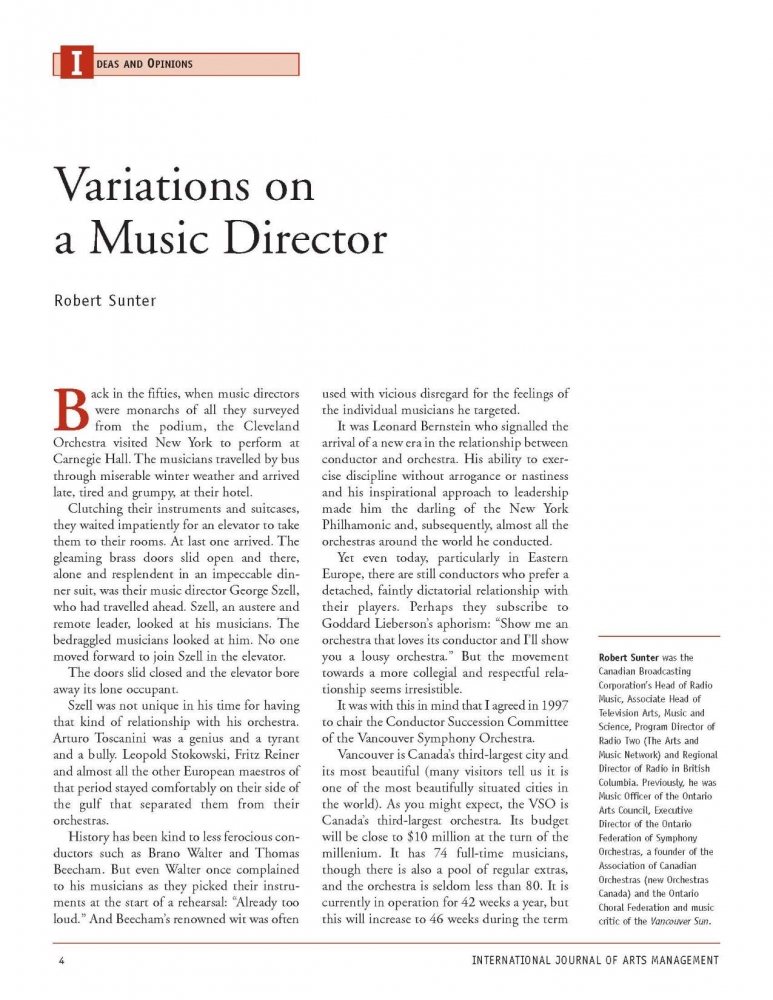Variations on a Music Director
Produit: Article
21,00 $ CA
R. Sunter
Robert Sunter was the Canadian Broadcasting Corporation’s Head of Radio Music, Associate Head of Television Arts, Music and Science, Program Director of Radio Two (The Arts and Music Network) and Regional Director of Radio in British Columbia. Previously, he was Music Officer of the Ontario Arts Council, Executive Director of the Ontario Federation of Symphony Orchestras, a founder of the Association of Canadian Orchestras (new Orchestras Canada) and the Ontario Choral Federation and music critic of the Vancouver Sun.
ABSTRACT
The appointment of a music director is the most important action an orchestra board is ever called upon to take. This fact makes it difficult to comprehend why so many of them use such a flawed, ad hoc search process to reach this crucial decision. The search is usually undertaken with too little preparation, in too short a time and guided by too little information and too little contact with the candidates. The Vancouver Symphony Orchestra’s 1996 Strategic Plan recognized this problem and a standing committee was formed charged with maintaining an inventory of conductors who fit the specific needs of the VSO and with developing a relationship with them. Unfortunately, the first search began soon afterwards and the committee was in the same old position as before. But next time will be different.
KEYWORDS
Dictatorship, tradition, standing committee, commitment, residency, trade-offs
RÉSUMÉ
La nomination d’un directeur artistique constitue la plus importante décision que soit appelé à prendre le conseil d’administration d’un orchestre. On comprend donc difficilement pourquoi ces instances recourent en grand nombre à un processus aussi imparfait qu’une recherche ponctuelle pour arriver à un choix à ce point crucial. En général, la recherche est entreprise sans préparation suffisante, menée trop rapidement et éclairée par trop peu d’information et de contacts avec les candidats. En établissant son plan stratégique 1996, de l’Orchestre symphonique de Vancouver (OSV) a reconnu le problème et créé un comité permanent chargé, d’une part, de dresser la liste des chefs d’orchestre dont le profil répond exactement aux besoins de l’OSV et, d’autre part, d’établir et d’entretenir des rapports avec eux. Malheureusement, une première recherche a dû être entamée peu après et le comité s’est retrouvé dans la même position qu’auparavant. La prochaine fois, ce sera différent.
MOTS CLÉS
Dictature, tradition, comité permanent, engagement, chef attitré, compromis
RESUMEN
El nombramiento de un director musical es la decisión más importante que pueda tomar el consejo de administración de una orquesta. Por lo tanto, resulta difícil comprender por qué tantos consejos utilizan un proceso de búsqueda tan viciado y poco sistemático para tomar una decisión tan crucial. Por lo general, se emprende la búsqueda sin suficiente preparación, con plazos demasiado cortos, sin disponer de suficiente información y después de establecer un contacto superficial con los candidatos. Se reconoció este problema en el Plan Estratégico de 1996 de la Vancouver Symphony Orchestra y se formó un comité permanente encargado de mantener un inventario de directores de orquesta que puedan satisfacer las necesidades específicas de la VSO (Vancouver Symphony Orchestra), así como de entablar una buena relación con ellos. Desafortunadamente, poco después se inició la primera búsqueda, otra vez sin suficiente preparación, y el comité se volvió a encontrar en la misma situación que antes. Pero la próxima vez será distinta.
PALABRAS CLAVE
Dictadura, tradición, comité permanente, compromiso, residencia, evaluación de ventajas y desventajas
